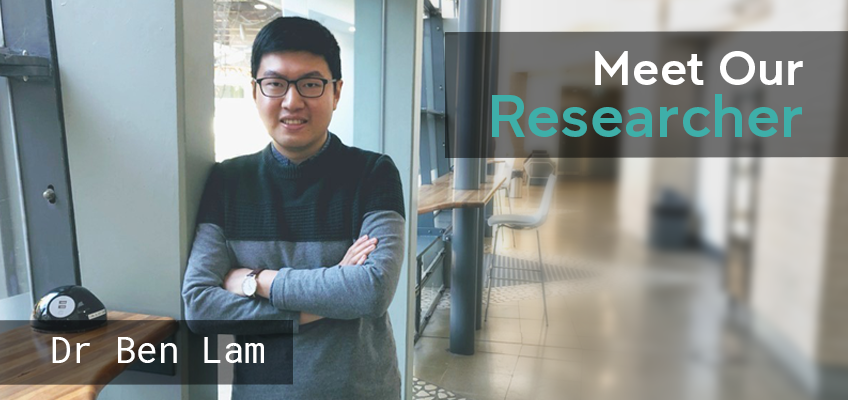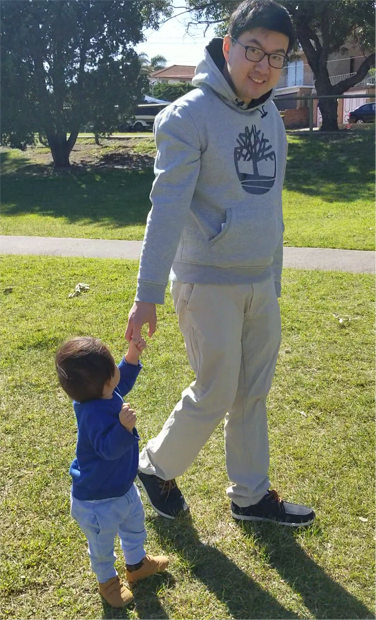11 Jun 2020

Cross-cultural differences, particularly in regard to older persons and their care, has produced diverse effects for dementia patients. Dr Ben Lam’s career experience abroad, particularly in Hong Kong, highlighted that cultures in which familial care of the elderly is the norm may have a positive effect on their social relationships and by extension their cognitive health. Working at CHeBA has given Dr Lam the opportunity to work alongside dementia clinicians and gain further insight into the day-to-day experience of patients affected by neurodegenerative disease.
How did you get into researching the ageing brain?
I studied my undergraduate and Honours degree in Psychology while living in Hong Kong. My Honours thesis topic was focused on depression and suicidal ideation. At that time, I was very interested in the study of mental health, though mainly in young adults. Following this, I completed a Masters in Psychology and did my training in cultural psychology, which focused on studying individuals with different ethnocultural backgrounds. From here I went on to complete a PhD at Iowa State University in the United States. After concluding my studies, I moved to Australia where I began working as a Postdoc at the University of Queensland - looking at retirement. We know that retirement is a challenging transition for many older adults. They can experience numerous difficulties adjusting to life without full-time work. We were trying to establish protective factors for older persons that are at risk of experiencing poor adjustment to everyday life post retirement. For example, last year we published a paper on the impact of social relationships on cognitive health following retirement.
We found that people who have more social relationships and engage in activities with friends and the community in general experience a lesser extent of cognitive decline after retiring.
Those who had poorer social engagement experienced greater cognitive decline at this time. My research on retirement and cognitive decline facilitated my interest in ageing and cognitive health, which is when I joined CHeBA and started working on various projects to do with ageing and dementia.
Did you experience a ‘defining moment’ which led you to this field?
Since studying my undergraduate degree, I have been interested in investigating mental health in different cultures. One of the members of my extended family in Hong Kong suffers dementia. In Hong Kong there has not been much emphasis on supporting people with neurodegenerative disease, and there is little understanding amongst the public, including my family members, about the effects of such diseases, particularly why those affects change so dramatically in persona. However, I do think that the culture in Hong Kong provides some benefits to those with dementia given it is considered the norm for one’s extended family to care for them in old age. This may have a positive effect on patients’ cognitive health as their social bonds are reinforced.
Considering the impact of cultural differences on cognitive health and finding ways to promote better ageing has sparked my interest in the field of dementia and ageing research.

Do you have any personal interests or activities which are protective behaviours against cognitive decline?
Moving from Queensland where I was a Postdoc to Sydney has been a little challenging. I have only been here for a short time and most of my social networks are in Queensland; it has been a process of beginning again to some extent. To become more socially engaged in Sydney we have joined some community activities, while at the same time we remain connected with our old networks online.
What are you currently researching?
I am conducting statistical modelling on dementia and ageing using COSMIC, a large collection of longitudinal studies on ageing and dementia. There are many studies on dementia which use various kinds of cognition and functional measures making it difficult to collate data and explore ways of looking at dementia in differing geographical regions. We are trying to model dementia as correlates of cognition and functional status regardless of the measures used and attempting to validate these metrics in order to standardise what is deemed as ‘dementia’ across these studies.
Why is your research important?
This research is critical as we are attempting to increase the effectiveness of dementia diagnosis. We hope to gain insight into dementia by harmonising study data in a way which makes study results more easily comparable.
What do you love about working for CHeBA?
I love working in a big group of researchers with varying expertise. Part of my role as a statistical consultant is to provide advice to people working in different areas of research, for instance neuroimaging and cognitive testing. I learn a lot by working with these people; not just about their field of specialisation but the way they understand ageing - particularly those who are working as clinicians. It has been a really fascinating experience gaining insight into the practical world of clinicians who actively work with patients suffering from neurodegenerative diseases.
What is the ultimate hope you have for your research?
We hope to develop a new approach to model data on dementia and the ageing process which are comparable across different geographical regions. This research will ultimately facilitate investigation on the protective and risk factors of dementia across regions.
This interview was undertaken during the COVID-19 self-isolation period. Dr Ben Lam found that having a short walk near the neighborhood and merely saying hello to familiar and unfamiliar faces in the community in distance supported his mental resilience and kept him feeling socially connected while physically isolated.
Donations are fundamental for critical research to continue following COVID-19.
If you would like to discuss supporting Dr Lam’s work specifically, or would like information
on leaving a legacy via a Gift in your Will, please contact h.douglass@unsw.edu.au.

Dr Ben Lam is a Postdoctoral Research Fellow at CHeBA and specialises in statistical consulting. Dr Lam completed his undergraduate and Honours degrees in Psychology at the Chinese University of Hong Kong, a Master of Psychology at the Hong Kong Polytechnic University and his PhD at the Iowa State University. Recently, Dr Lam published an insightful paper on the impact of social relations on buffering cognitive decline post retirement. It is evident that our social bonds and activities have a positive effect on cognitive health. Since moving to Sydney in 2019, Dr Lam and his family have joined various community activities to facilitate new social connections and adjust to their new environment as well as stay cognitively healthy.
